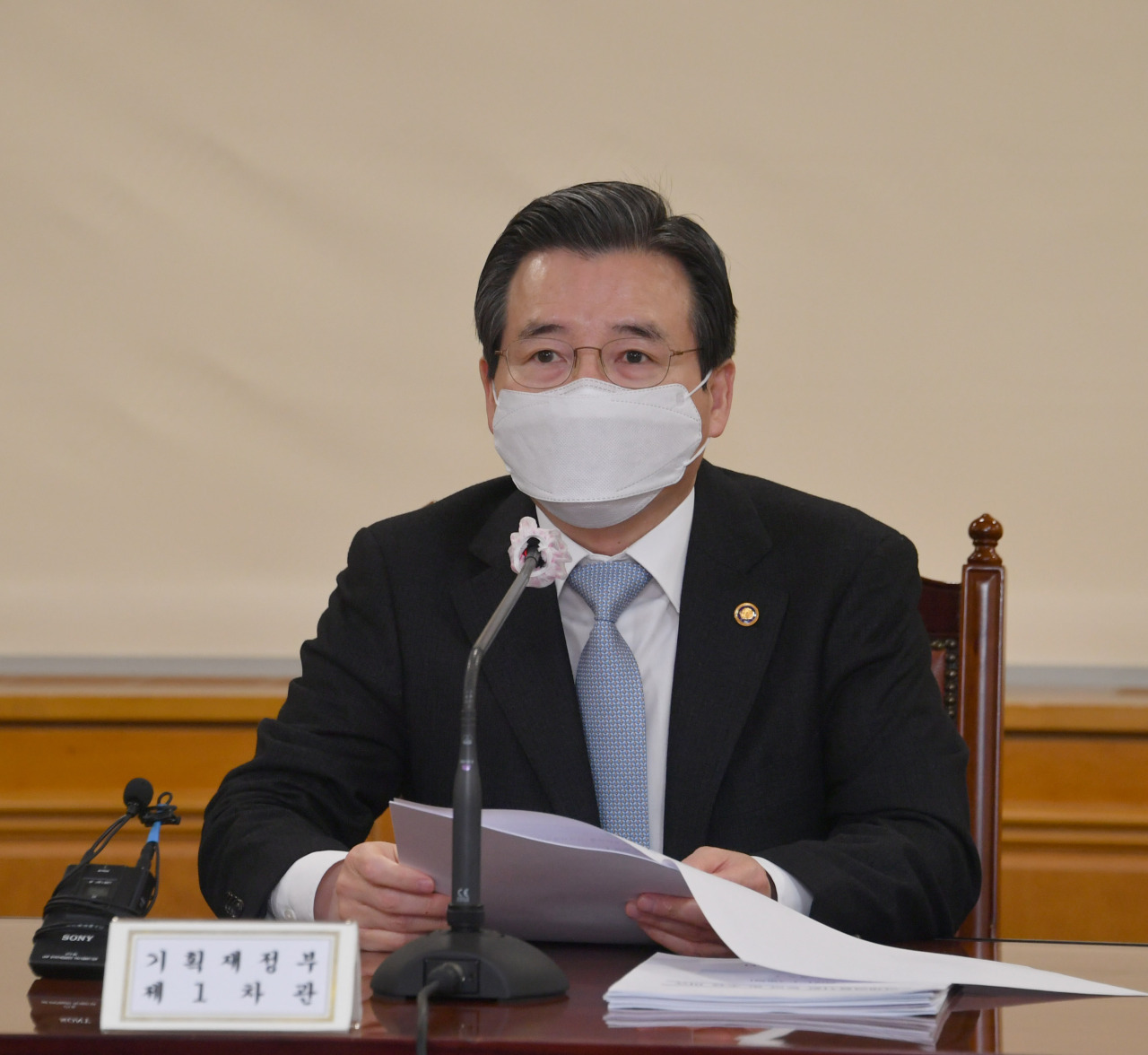Surging US Treasury yields to affect global FX market: vice minister
By Jung Min-kyungPublished : Jan. 19, 2021 - 15:21

The rising US Treasury yields has become a “key variable in the global foreign exchange market,” South Korea’s vice finance minister said Tuesday, nodding towards a stronger dollar trend that has rattled emerging market currencies.
“When the 10-year US Treasury yield surpassed the 1 percent mark (earlier this month), the Euro, the Japanese Yen and the Chinese Yuan all dropped against the US greenback,” Vice Finance Minister Kim Yong-beom said in a macroeconomic finance meeting.
“There were projections that the US Federal Reserve would dial down quantitative easing on expectations of higher inflation, but the Fed Chairman Jerome Powell and ranking officials’ remarks hinting their willingness to maintain the current monetary policy quelled market concerns,” he added.
The 10-year US Treasury yield – which had hovered below the 1 percent mark throughout majority of 2020 – soared to 1.04 percent on Jan. 6 and eventually to 1.15 percent on Jan. 11. It stood at roughly 1.11 percent as of Tuesday.
The catalyst behind the latest surge is growing anticipations of an economic recovery in the US, over President-elect Joe Biden’s $1.9 trillion stimulus plan coupled with optimism for vaccinations. This in turn, fueled expectations for inflation increase and worries that it could deal a blow to the Korean stock market.
“If the inflation pressure cooks up faster-than-expected, it could bring about a surge in market yields and an early change to the current monetary policy, prompting further market caution,” Ha Keon-hyeong, an analyst at Shinhan Investment Corp. said.
There is also the possibility that a surging bond yield could lead to a mass selling spree, according to Oh Tae-dong, a senior researcher at NH Investment Securities.
In terms of emerging market currencies, including the Korean won, which are vulnerable to changes in the US dollar, experts are divided on the possible risks that the rise in the key global benchmark yield poses.
The surge in the US government bond yield, which raises the prospect of a halt in the dollar’s recent slide, could cut short the strong won trend. However, Citigroup said in a recent note that the surge poses a limited risk to emerging-market currencies, as the US Fed would eventually monetize the additional bond supply, which is likely to weaken the dollar.
On local treasury yields, Kim noted the widening gap in yields between 3-year Treasury bonds and longer-term 10-year government bonds, in line with the US yield surge and anticipations of economic recovery.
The yield curve of 3-year and 10-year treasury bonds came to 76.9 basis points on Jan. 5, marking the widest gap since June 2015. The government will closely monitor any related volatilities, Kim said.
Asia’s fourth-largest economy said in December that it plans to sell state bonds worth a combined 176.4 trillion won ($160 billion) this year to support its fiscal spending tied to the pandemic.
By Jung Min-kyung (mkjung@heraldcorp.com)
“When the 10-year US Treasury yield surpassed the 1 percent mark (earlier this month), the Euro, the Japanese Yen and the Chinese Yuan all dropped against the US greenback,” Vice Finance Minister Kim Yong-beom said in a macroeconomic finance meeting.
“There were projections that the US Federal Reserve would dial down quantitative easing on expectations of higher inflation, but the Fed Chairman Jerome Powell and ranking officials’ remarks hinting their willingness to maintain the current monetary policy quelled market concerns,” he added.
The 10-year US Treasury yield – which had hovered below the 1 percent mark throughout majority of 2020 – soared to 1.04 percent on Jan. 6 and eventually to 1.15 percent on Jan. 11. It stood at roughly 1.11 percent as of Tuesday.
The catalyst behind the latest surge is growing anticipations of an economic recovery in the US, over President-elect Joe Biden’s $1.9 trillion stimulus plan coupled with optimism for vaccinations. This in turn, fueled expectations for inflation increase and worries that it could deal a blow to the Korean stock market.
“If the inflation pressure cooks up faster-than-expected, it could bring about a surge in market yields and an early change to the current monetary policy, prompting further market caution,” Ha Keon-hyeong, an analyst at Shinhan Investment Corp. said.
There is also the possibility that a surging bond yield could lead to a mass selling spree, according to Oh Tae-dong, a senior researcher at NH Investment Securities.
In terms of emerging market currencies, including the Korean won, which are vulnerable to changes in the US dollar, experts are divided on the possible risks that the rise in the key global benchmark yield poses.
The surge in the US government bond yield, which raises the prospect of a halt in the dollar’s recent slide, could cut short the strong won trend. However, Citigroup said in a recent note that the surge poses a limited risk to emerging-market currencies, as the US Fed would eventually monetize the additional bond supply, which is likely to weaken the dollar.
On local treasury yields, Kim noted the widening gap in yields between 3-year Treasury bonds and longer-term 10-year government bonds, in line with the US yield surge and anticipations of economic recovery.
The yield curve of 3-year and 10-year treasury bonds came to 76.9 basis points on Jan. 5, marking the widest gap since June 2015. The government will closely monitor any related volatilities, Kim said.
Asia’s fourth-largest economy said in December that it plans to sell state bonds worth a combined 176.4 trillion won ($160 billion) this year to support its fiscal spending tied to the pandemic.
By Jung Min-kyung (mkjung@heraldcorp.com)












![[Today’s K-pop] BTS pop-up event to come to Seoul](http://res.heraldm.com/phpwas/restmb_idxmake.php?idx=644&simg=/content/image/2024/04/17/20240417050734_0.jpg&u=)





![[KH Explains] Hyundai's full hybrid edge to pay off amid slow transition to pure EVs](http://res.heraldm.com/phpwas/restmb_idxmake.php?idx=652&simg=/content/image/2024/04/18/20240418050645_0.jpg&u=20240419100350)

![[Today’s K-pop] Zico drops snippet of collaboration with Jennie](http://res.heraldm.com/phpwas/restmb_idxmake.php?idx=642&simg=/content/image/2024/04/18/20240418050702_0.jpg&u=)